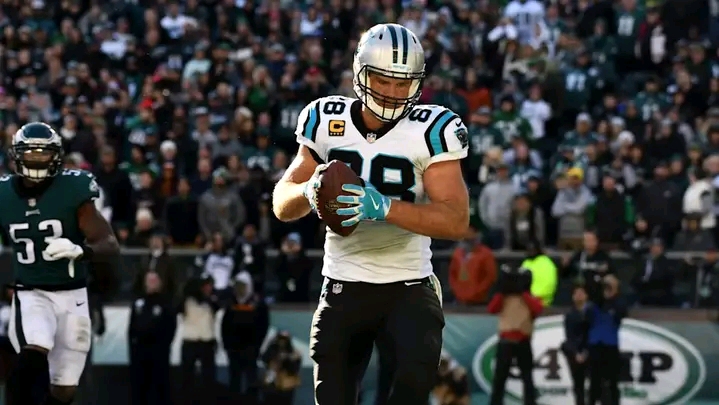In the ever-evolving world of the NFL, few plays have sparked as much debate and intrigue as the “tush push.” What began as a clever, sometimes controversial short-yardage maneuver has transformed into a legitimate weapon, and the Philadelphia Eagles have become the latest team to wield it with authority. Recently, during a candid conversation, Panthers great Greg Olsen laid out for me why the Eagles, after their 2022 and 2023 performances, have unequivocally earned the right to employ the tush push in their arsenal — a move that signals a shift in how power football is played and perceived
For the uninitiated, the tush push is a quarterback sneak variant. In it, the quarterback, often a mobile but compact player, receives a gentle shove from a teammate—usually a fullback or tight end—right into the defensive line, helping the ball carrier gain critical inches or yards. The tactic exploded into the spotlight thanks to Josh Allen and the Buffalo Bills, where Allen’s size and strength, combined with his teammates’ well-timed push, often shattered defensive expectations.
Critics initially derided the play as a loophole exploit or “cheap” football. Some fans and analysts called it borderline illegal, claiming it undermined the spirit of fair play in short-yardage situations. But NFL rules allow it—so long as the push comes from behind and no player grabs or pulls the quarterback forward. This subtle but important distinction turned the tush push from a flashy novelty into a strategic tool.
Greg Olsen knows the trenches. As one of the best tight ends of his era, he not only caught passes but led blocks and powered through defensive lines. So, when he speaks about the tush push, it’s not just theory — it’s practical, lived experience.
Olsen pointed out that the Panthers tried variations of the push during his career but never to the degree the Eagles have. The difference? The Eagles’ commitment to a power-running game that complements their quarterback’s skill set. They don’t rely on the push as a gimmick; it’s an extension of their identity.
“Philadelphia has built a physical team,” Olsen explained. “They’re not just throwing it around or relying on one explosive player. They have a dominant offensive line, a bruising running back, and a quarterback who can both take the hit and push through it. The push isn’t a trick play for them; it’s a natural outgrowth of their style.
Olsen emphasized that to use the tush push effectively, a team must first control the line of scrimmage. The Eagles, led by their dominant offensive line — featuring players like Jordan Mailata and Lane Johnson — have been one of the NFL’s most physical fronts. This kind of muscle power doesn’t just open holes for the running backs but makes short-yardage situations predictable and winnable.
He told me, “You can’t just shove the quarterback forward and expect results. You need that trench dominance. The Eagles have earned the right because they are outmuscling defenses every snap. It’s a testament to their preparation and physicality.”
The Eagles’ head coach, Nick Sirianni, has also emphasized a run-first mentality in critical situations, reinforcing the mindset that power football is alive and well in Philadelphia. With Jalen Hurts at quarterback — a player who can both scramble and absorb contact — the tush push fits naturally into their offensive philosophy.
One of the most interesting points Olsen made was about the nuances of NFL rules and how savvy teams exploit them within the boundaries of fair play.
“The push is legal because you’re not grabbing the quarterback or pulling him,” Olsen said. “It’s a forward assist, a momentum help, nothing more. That’s why the league allows it. They’ve clarified it so teams know where the line is. What the Eagles are doing is smart. They’re working within the rules, not bending them.”
This insight shifts the narrative from viewing the tush push as cheating or unsportsmanlike to seeing it as a legitimate strategic innovation. It’s akin to how the use of the shotgun formation or the no-huddle offense changed the game decades ago.
The Eagles’ embrace of the tush push is part of a broader trend in the NFL — a renaissance of power football that values physicality, grit, and incremental gains over flashiness and trick plays.
“Football has cycles,” Olsen reminded me. “For a while, it was all about spread offenses and passing. Now, we see a swing back to the run game and power football, especially in critical situations like third-and-short or goal line. The Eagles are at the forefront because they combine old-school toughness with modern athleticism.”
He sees this trend continuing, with other teams likely adopting similar tactics if they can build the right personnel. The tush push could become a staple play, just like the draw or the QB sneak.
Of course, not everyone is sold on the tush push. Some argue it increases injury risk, particularly for quarterbacks forced into contact, or that it detracts from creative play-calling.
Olsen acknowledged these concerns but offered a measured response. “Any play that involves contact has risk. That’s football. But teams are smart about who they use for the push and when. They want their quarterbacks healthy as much as anyone. And as for creativity, the tush push is just one tool in a big toolbox. It doesn’t replace flashy plays; it complements them.”
The Eagles’ success with the tush push forces analysts and fans to rethink what’s fair and what’s effective. It’s a reminder that the NFL is a chess game, where every rule nuance can be exploited with skill and preparation.
Greg Olsen’s insights have convinced me that the Eagles aren’t just “cheating” or being lucky — they have earned this right through hard work, talent, and strategic brilliance. The tush push, once a niche play, is now a symbol of the modern NFL’s blend of tradition and innovation.
As a longtime observer of the game, I’ve come to respect teams that adapt intelligently to the rules and find competitive advantages. The Eagles’ tash push is one such example.
It’s easy to get caught up in the theatrics of sports controversy, but at the core, the game rewards toughness, discipline, and smart execution. Philadelphia’s embrace of the tush push embodies all three.
Greg Olsen’s perspective was invaluable, reminding me that true football greatness is earned on the field, not just in headlines. And by that measure, the Eagles have absolutely earned the right to employ the tush push.

